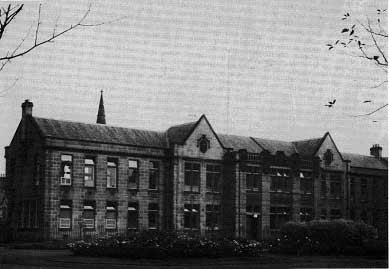|
Memories of a childhood in wartime Leith. The trials and tribulations of the period, allied to the camaraderie of the community in facing up to an uncertain future made a lasting impression on John Stewart.
Young as we were, we were able to do our bit for the War Effort. In school we took our regular savings each week to purchase National Savings Stamps. Once the sum of 15/- was saved, the stamps were then exchanged for Savings Certificates.
On a more physical effort, we sought out old scrap metal. We would collect a handcart from the local cleansing depot in Junction Place and wheel it around our area. Working as a team, we would then go around each household and request any old metal products as well as waste paper.
Once loaded up, the cart was then taken back and off-loaded. All our collection then went for recycling. Pigswill was another of our responsibilities. No waste food would go in the dustbin; it would be confined to the pigswill bin.
A child's contribution to fighting the War on the home front was limited, but we in the 'Coppy' (tenement building) had a unique input.
The boys volunteered themselves as guinea pigs to take part in the weekly Thursday evening de-contamination exercise in Leith Hospital. It must have been around 1941 when these began.
Two porters in the hospital, the brothers Mick and Johnny Malone who lived in the 'Coppy' recruited ten of us for this. We reported to the office in the main hall on the first night and were then given our instructions.
Among those who volunteered on this night were, Johnny Letford, Peter Meaney, Peter Lynch, James Braidwood, James Minto, David Lothian, Billy King, George Sheriff, Johnny Livingston and myself.
Each of us were allocated a rigid steel mesh stretcher that we laid out in rows on the halls floor. Ushered into a side room, each of us donned a pair of swimming trunks beneath our short trousers before lying down on the stretchers with a blanket over us.
In turn we were borne out of the hospital by two orderlies dressed over all in gas protective gear. The reaction of some of the girls outside who witnessed this had to be seen. Some were in tears obviously unaware that it was only an exercise!
We were then carried back into the hospital through a side door and deposited onto a trolley and left in charge of a nurse. She immediately began stripping off our clothes until we were left in our swimming gear. I can still feel the chill of the cold steel mesh of the stretcher as I lay back on it.
After being covered again by the blanket, we were wheeled one at a time into a small narrow corridor barely long enough to accommodate the trolley. She left closing the door behind her.
A bell rang then the door at the other end opened and a nurse drew the trolley out into a large room that contained numerous pipes, valves and hoses with water swirling about the feet of all who were in attendance.
Doctors, nurses and other attendants, all enveloped in waterproof clothing including rubber boots, swarmed around us as we were manoeuvred into position for the cleansing.
There were two stations operating at the one time so it was a welcome sight to see one or another of your friends having the same treatment. I must admit that on my first experience of the de-contamination I was somewhat full of trepidation. Although my older comrades had assured me that there was 'nowt to be scared o', I was still nervous.
The blanket was stripped off me leaving me staring up into the faces of the numerous cleansers. Hoses and syringes squirting water were inserted into my ears and nose, and particular attention was paid to my armpits and behind my knees. Hair was also thoroughly cleansed.
Obviously in a real-life situation a complete body wash would have taken place to ensure that no pockets of gas lurked in any private parts of the body. Hence the wearing of trunks in this simulated exercise. 
Leith Hospital, Children's Wing
This part completed, I was then dried and swaddled and placed upon another trolley with hot-water bottles all around me. I was then wheeled into the original room where my clothes had been returned. One by one we were reunited and all got dressed as the doctors and others joined us.
These adults then drew cash from their pockets and distributed it among us. A complete wash and being paid for it too! Bearing in mind we came from homes that were devoid of running hot water, let alone baths, this was just great.
With this money in our pockets, we repaired to the 'chippy' called Pacitto's, at the top of Bangor Road for peas and vinegar. We were to repeat this exercise every Thursday evening for a year until the need for it was no longer felt.
John Stewart, 2001
| |


